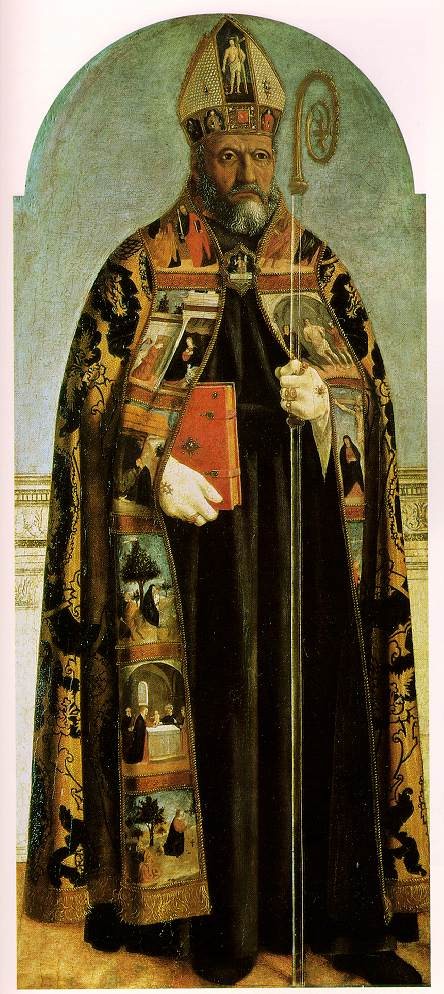 In Book 4, Augustine tells us that he lived with a girl whom he does not name. The relationship was for pleasure and not for the purpose of marriage and family though he acknowledges that he was faithful to her. Later in Book 6 we will glimpse the deeper feeling he felt for this woman (6.15.25). Based on his discussion of his son Adeodatus in 10.6.14 the chronology of these nine years does not appear to be clear. It is likely that he had already taken this partner earlier (cf. 2.2.4).
In Book 4, Augustine tells us that he lived with a girl whom he does not name. The relationship was for pleasure and not for the purpose of marriage and family though he acknowledges that he was faithful to her. Later in Book 6 we will glimpse the deeper feeling he felt for this woman (6.15.25). Based on his discussion of his son Adeodatus in 10.6.14 the chronology of these nine years does not appear to be clear. It is likely that he had already taken this partner earlier (cf. 2.2.4).
Augustine relates a number of anecdotes from his life. A sorcerer tries to have Augustine engage his services in order to win a poetry contest through his occult arts and Augustine refuses. On the other hand, Augustine is greatly attracted to astrology. Looking back he sees how wrong minded this is and how even if astrology were to seem correct in its predictions this could be due to chance which he compares to the practice of randomly opening a book and happening upon a passage that appears to give a hidden message.
As the Catechism reminds us all forms of divination are grave sins against the first commandment;
All forms of divination are to be rejected: recourse to Satan or demons, conjuring up the dead or other practices falsely supposed to "unveil" the future. Consulting horoscopes, astrology, palm reading, interpretation of omens and lots, the phenomena of clairvoyance, and recourse to mediums all conceal a desire for power over time, history, and, in the last analysis, other human beings, as well as a wish to conciliate hidden powers. They contradict the honor, respect, and loving fear that we owe to God alone. (CCC 2116)
In this book Augustine also relates the painful experience of the death of a friend in Thagaste. One of the overall themes of Confessions is that of ‘friendship’ both in its positive and negative aspects. Augustine clarifies that “friendship is genuine only when you bind fast together people who cleave to you [God] through the charity poured abroad in our hearts by the Holy Spirit” (4.4.7). In this anecdote, he discusses a deep but purely human friendship. Meeting a childhood friend, Augustine leads him into Manichaeism and together they experience a friendship ‘sweeter than any sweetness’ (4.4.7). After only a year of being friends, the young man becomes fatally ill with a fever and is baptized. To Augustine’s surprise when his friend recovers temporarily he completely rejects Manichaeism. Augustine describes the anguish of their parting but comes to realize that his misery is due to his mind being chained by friendship to mortal things (4.6.11). “Woe to the madness which thinks to cherish human beings as though more than human!” (4.7.12). His intense grief over this loss, lead him to leave Thagaste and his memories there and to move to Carthage. In Carthage he notes that “what restored and re-created me above all was the consolation of other friends” (4.8.13) and allowing his mind to be distracted by their pleasant company.
This distraction is not truly a cure for his soul. Confronted with the death of a friend, the ‘god’ of Manichaeism is not able to bring rest to his soul. He is unable to live with his grief or to flee from it though he does flee to Carthage. The ‘re-creating’ he speaks of above is related to what he says about time. He writes;
Time does not stand still, nor are the rolling seasons useless to us, for they all work wonders in our minds. They came and went for day to day, and by their coming and going implanted in me other hopes and other memories. (4.8.13)
Time “becomes a principle of association that collects and disperses ideas and memories into the unity of the present moment”[i] The ideas and memories from earlier times are juxtaposed by time to rearrange their order and significance. Recollection is possible because time is linear but it is also discontinuous and reconstruction is necessary. The key to reconstruction or transformation is learning to love all things in God. Augustine writes;
If sensuous beauty delights you, praise God for the beauty of corporeal things, and channel the love you feel for them onto their Maker (4.12.18).
This is not a naive denial of the continued power of concupiscence after our conversion. Augustine notes, “Why follow your flesh, perverted soul? Rather let it follow you, once you are converted” (4.11.17). This is not to imply that once we are converted we effortlessly return to the state of original innocence experienced by our first parents in the garden. Augustine continues,
Return to your heart, then, you wrongdoers, and hold fast to him who made you. Stand with him and you will stand firm, rest in him and you will find peace. Where are you going, along your rough paths? (4.12.18).
We must seek Christ, the bridegroom, who has withdrawn from our sight, “so that we might return to our own hearts and find him there” (2.12.19). This interior transformation allows us to bring Christ into the world carry others off to God, because we “burn with the fire of charity” as we speak in the Spirit.
Text © Scott McKellar 2011
[i] Vaught, Journey, p. 98.

No comments:
Post a Comment